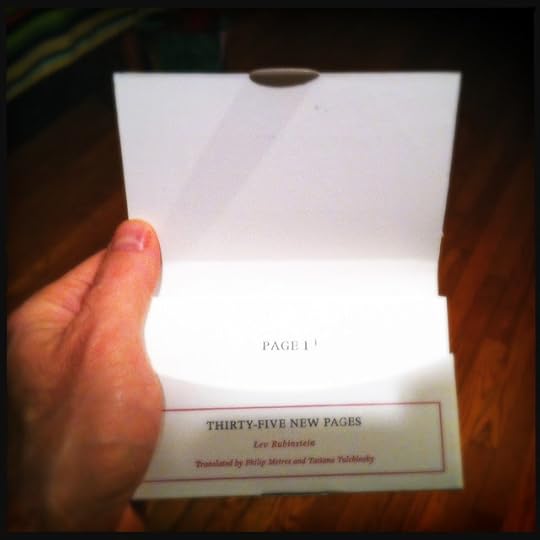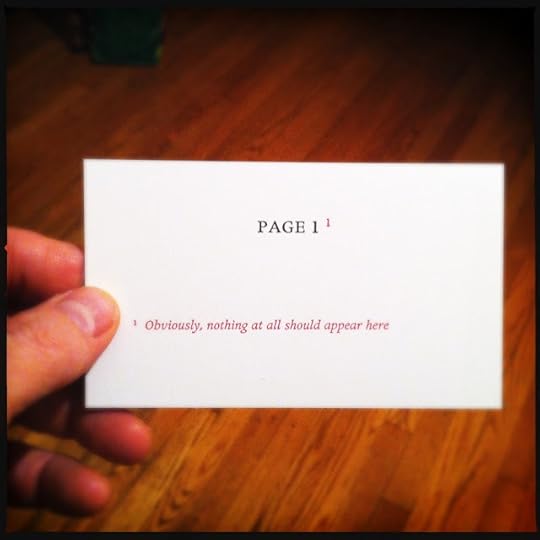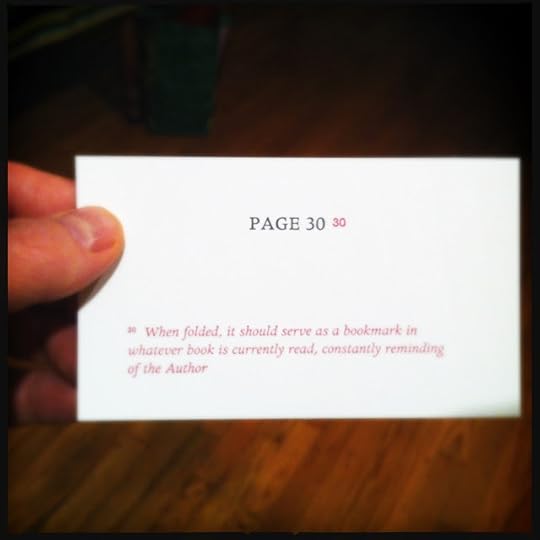Pick a Card

I am drawn to books of poetry on cards, and I didn't realize it until today. Robert Grenier's Sentences . Susan Howe's Poems Found in a Pioneer Museum . bpNichol's still water . The many many works of poetry that Márton Koppánny has produced on cards. To that list, I will now add Lev Rubinstein's Thirty-Five New Pages , recently published by Ugly Duckling Presse.
This is a book to manipulate, a tactile book, haptic. It gains value by forcing us to deal with the pieces of it. But it comes at us, as you can see above disguised as a codex, bearing even its title on its spine, which you could slip between two other tiny books and not recognize, without close inspection, that the book is a box.

These thirty-five cards work through a process of repetition, the slow working out of a thought with few words. Each card is a page numbered, the number appearing at the top of the page as a title. And every title has a small superscript number bearing the same number as the page. And each of these superscript numbers directs you to a footnote, and each of those footnotes tells you what should be on the page, not what is there, but what should be.

As we might guess, the first card should be blank, a blank flyleaf before the title page, and then the numbers pull you into the book that is nothing but a deck of stiff cards in our hands. Rubinstein plays games with you as thoughts slowly and indefinitely arise from the sturdy pages in your hands. "Here," you read in the fourteenth footnote, which appears on Page 14, "something should be written," and you realize it has been. These are conceptual games, but serious, and satisfying. I smiled broadly near the end of the book, filled with a kind of joy at the beautiful rendition of the book's own genius in my head.

I am reminded most, in these cards, of the work of Márton Koppánny, which is also conceptual in this playful way (though also much more visual in intention), and that is a good thing. This text is clean, emotionless, without subject, because it is all subject, because it is about us, about the act of reading, and about the expectations we bring to any process of reading. The book may be a bit pricey given its size, but the joy of reading it doesn't diminish with time.
I'll end, though, with two quibbles: the box itself is far too thin. It needed to have been much sturdier. Books in boxes usually have much stronger boxes, and this one even shows some creasing from merely being assembled by hand. Second, the translation is really not perfect. Maybe this was intentional, but a number of times near the end of the book the text simply isn't idiomatic English. Read Page 30, "is currently read" should be "is currently being read" and "constantly reminding of the Author" should be "constantly reminding one [or you or us] of the Author." I can't imagine a need for this clumsy English.
Still I love the book. It was the first I read this year and the first I reviewed, and it's from Ugly Duckling Presse, and it has a number in its title, and I'm sure it will be one of my favorites of the year even by the end. Just as last year the first book I read and reviewed was a book from Ugly Duckling Presse that had a number in its title: Sarah Riggs' 60 Textos.
I see a pattern, and that is what this book is about: the patterns of reading, the patterns of being, the patterns of expectation.
_________
Rubinstein, Lev. Thirty-Five New Pages. Translated by Philip Metres and Tatiana Tulchinsky. Brooklyn, N.Y.: Ugly Duckling Presse, 2011. US$15.
ecr. l'inf.
Published on January 02, 2012 20:54
No comments have been added yet.



